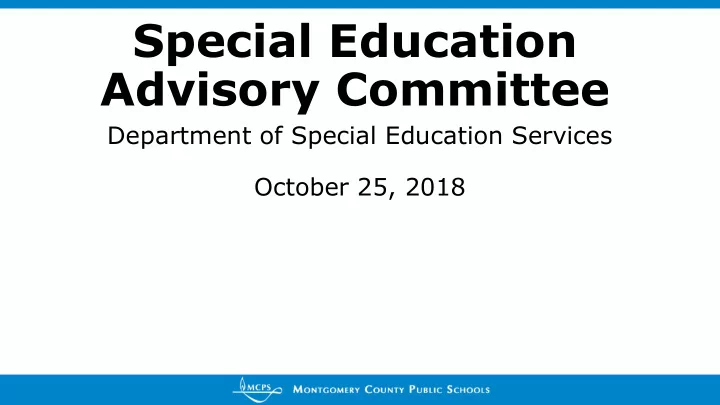

Special Education Advisory Committee Department of Special Education Services October 25, 2018
Outcomes: At the end of this meeting we will have: ● Heard public comments ● Received information on the state of Special Education in MCPS ● Received information about early literacy and family engagement ● Networked with other parents/guardians
Our Mission The mission of the Department of Special Education Services (DSES) is to provide, implement, and monitor the delivery of a seamless continuum of services for students with disabilities from birth through age 21 to prepare for college, career and community readiness.
MSDE 2017 Census Data
MSDE 2017 Census Data
Strategic Priorities Goals: ● Increase achievement for special education students ● Increase students in the Least Restrictive Environment ● Sustain and expand partnerships ● Improve central office support with Social Emotional Support Services (SESS)
Improvement Plans • Strengthen the elementary Home School Model and middle school services through job-embedded professional learning • Increase independence in elementary learning center students • Monitor the implementation of evidence-based reading and mathematics interventions through Performance Matters • Update Collaborative Problem Solving Manual to incorporate the Multi-Tiered System of Supports (MTSS) • Provide curriculum resources for staff teaching students pursuing Alternate Learning Outcomes • Increase services to preK students in regular early childhood settings
Grant Work 2018 – 2019 ❖ Home School Model and Secondary Inclusion ❖ Orton Gillingham Training ❖ Early Childhood ❖ Multi-Tiered Systems of Support ❖ Academic Interventions ❖ Nonviolent Crisis Intervention (CPI) ❖ Family and Community Partnerships ❖ Transition
Family Support and Engagement Resources Understanding what Happens at Meetings Conducted Prior to IEP Meetings IEP Meetings Final 10 18 9
Partnerships Down Syndrome Network 10
Community Partnerships and Resources The Arc Montgomery County Partnership for Extraordinary Minds Down Syndrome Network Council for Exceptional Children Conference Montgomery College/Transition Services Holy Cross Hospital Parent Summit Resource Fair —20 Community Resources 11
Community Partnerships and Resources The Arc Montgomery County • MCPS Staff Present at Tools for School • Parent Summit Presentations and Resource Table • Building Bridges • MacDonald Knolls Early Childhood Center 12
Collaboration on Foundational Reading The Office of Special Education (OSE) and the Office of Curriculum and Instructional Programs (OCIP) have been collaborating to improve instruction in foundational reading. 13
Curriculum audit • Johns Hopkins Institute for Education Policy reviewed the curriculum in Montgomery County Public Schools (MCPS) • The evaluation team recommended that MCPS implement new instructional materials in ELA and math • Transition to new curriculum over a multiple year period • Implement a robust professional learning plan • Focus on successful implementation and support to schools 14
Request for Proposal ● Need for systematic, explicit, research-based and differentiated phonics instruction ● Alignment to the Maryland College and Career Ready Standards ● Explicit language to address the needs for special populations (advanced learners, students receiving special education services, and English Language Learners). ● Clear expectations for professional development before, during and after rollout. ● Inclusion of tools to engage parents in new and innovative ways. 15
Foundational Reading Skills The Dynamic Indicators of Basic Early Literacy Skills (DIBELS): series one-minute tasks, that measures children’s abilities to hear sounds in words, connect sounds with letters, sound out words, and read and understand text passages, as well as gain vocabulary knowledge MAP Reading Fluency: Online, adaptive assessment administered three times a year to all students kindergarten through second grade. It measures oral reading fluency, decoding accuracy, and literal comprehension 16
Foundational Reading Skills Multi-Tiered Systems of Support (MTSS): Schools will receive guidance on supporting students based on their identified needs, not based on their label, in tier 2 and tier 3 interventions 17
Professional Learning to address Foundational Reading Orton Gillingham methodology training in 40 elementary schools • Each school will have a special educator and reading specialist • trained Content specialists from OSE, OCIP, and Office of School Support • and Improvement will be trained and support the implementation Methodology will consist of: • Phonemic Awareness • Multi-sensory strategies for reading, writing, and math • Syllabication patterns encoding/decoding • Assessment techniques • 18
Foundational Reading Skills Interventions: OSE and OCIP are collaborating on central office supported interventions Performance Matters: Data from select central office supported interventions will be captured and monitored Professional Learning: Variety of opportunities including online modules 19
Questions 20
Recommend
More recommend